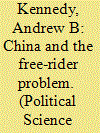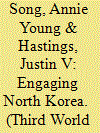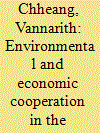|
|
|
Sort Order |
|
|
|
Items / Page
|
|
|
|
|
|
|
| Srl | Item |
| 1 |
ID:
137798


|
|
|
|
|
| Summary/Abstract |
IS CHINA PULLING ITS WEIGHT IN THE INTERNATIONAL SYSTEM? In recent years, China has increased its contribution to United Nations peacekeeping, raised its foreign aid to impoverished countries, and made significant commitments to global arms control initiatives.1 Even so, a rising chorus of voices has charged that China is “free riding” on cooperation undertaken by the United States and other countries that provides benefits to the wider international community. Calling China a free rider is nothing new; scholars described China as free riding on nuclear arms control agreements and international environmental cooperation as early as the 1990s.2 Yet with the United States beset by financial and economic woes in recent years, allegations that Beijing free rides on the United States and other countries have grown more frequent and more impatient. Whether the issue is fighting terrorism or preventing nuclear proliferation, it has become routine—particularly in the United States—to complain that China is not doing enough to support international cooperation.3 The number of articles containing both of the terms “China” and “free rider” in the Factiva database, for example, increased from an average of 39 per year from 2005 to 2009 to 75 per year from 2010 to 2013. Chinese observers, meanwhile, argue among themselves whether China free rides (da bian che) on the collective action of other states.4 Some agree that China should be seen as a free rider, at least in some areas.5 Other Chinese writers disagree and reject the notion that China should take on “even more responsibility” for global governance.
|
|
|
|
|
|
|
|
|
|
|
|
|
|
|
|
| 2 |
ID:
186105


|
|
|
|
|
| Summary/Abstract |
This article provides empirical evidence of the emergence of new private governance forms through three case studies: transboundary air pollution, green supply chain, and energy transition in Northeast Asia. This article also refers to private governance theories discussed in the context of global environmental governance. Consistent with the private authority theory, entrepreneurs with vast expertise and capacity to provide useful information and practices have emerged. They allow stakeholders to cooperate in regional environmental sustainability under the conditions of weak or no focal institutions and heterogeneous state preferences. This observation is consistent with the global trend of environmental governance, which is shifting from regulatory-based to goal-setting governance. As global partnership theory suggests, hybrid forms of private governance, including various local- to global-level public–private partnerships, emerge across the cases. However, these forms of governance are still in the embryonic stage, where their functions of private authority are not fully developed. These insights challenge the predominant view on the limited roles of nonstate actors in building regional environmental governance in Northeast Asia as discussed in the existing literature.
|
|
|
|
|
|
|
|
|
|
|
|
|
|
|
|
| 3 |
ID:
175051


|
|
|
|
|
| Summary/Abstract |
Despite ongoing political tensions and sanctions, North Korea and South Korea have made some progress in forestry cooperation. To explain the persistence of this cooperation, we draw upon a local approach to environmental peacebuilding. By tracing inter-Korean forestry cooperation from 2000 to 2018, this study finds that cooperation persists because of a North Korean desire for cooperation specifically on the environment, and because non-governmental organisations (NGOs) with close ties to the South Korean government provided an alternative way to implement inter-Korean forestry cooperation through periods of tension. Our findings also highlight the benefits of using environmental cooperation as a way to engage with North Korea in a depoliticised and sanction-free context. This finding has far-reaching implications for environmental peacebuilding. First, NGOs can pave the way for engaging conflict parties even in the face of ongoing hostility. Second, environmental cooperation provides an opportunity for a win–win strategy for conflict parties.
|
|
|
|
|
|
|
|
|
|
|
|
|
|
|
|
| 4 |
ID:
100151


|
|
|
|
|
| Publication |
2010.
|
| Summary/Abstract |
Greater Mekong Subregional Integration has been promoted quite remarkably in the past decade with the support from key international and regional actors. Hard and soft infrastructure has been developed extensively. The road connection development in the Greater Mekong Subregion under the framework of East-West Corridor and North-South Corridor encourages more human and goods exchanges. The policy coordination and harmonization among the countries in the region have been upgraded but at a very slow pace. The future of the regional integration in the region is realizable through hard and soft infrastructure integration. As this article attempts to demonstrate, the main concern, though, still surrounds the issue of political willingness and real cooperation.
|
|
|
|
|
|
|
|
|
|
|
|
|
|
|
|
| 5 |
ID:
163502


|
|
|
|
|
| Summary/Abstract |
Environmental peacebuilding represents a paradigm shift from a nexus of environmental scarcity to one of environmental peace. It rests on the assumption that the biophysical environment’s inherent characteristics can act as incentives for cooperation and peace, rather than violence and competition. Based on this, environmental peacebuilding presents cooperation as a win-win solution and escape from the zero-sum logic of conflict. However, there is a lack of coherent environmental peacebuilding framework and evidence corroborating the existence of this environment-peace nexus. Building on a multidisciplinary literature review, this article examines the evolution of environmental peacebuilding into an emerging framework. It unpacks the concept and explains its main building blocks (conditions, mechanisms and outcomes) to develop our understanding of when, how and why environmental cooperation can serve as a peacebuilding tool. It assembles these building blocks into three generic trajectories (technical, restorative and sustainable environmental peacebuilding), each characterised according to their own causality, drivers and prerequisites, and illustrated with concrete examples. Finally, this article draws attention to the remaining theoretical gaps in the environmental peacebuilding literature, and lays the foundations for an environmental peacebuilding research agenda that clarifies if and how environmental cooperation can spill over across borders, sectors and scales towards sustainable peace.
|
|
|
|
|
|
|
|
|
|
|
|
|
|
|
|
| 6 |
ID:
082231


|
|
|
|
|
| Publication |
2007.
|
| Summary/Abstract |
Up until now, Japan's environmental cooperation with China has principally been in response to requests by the Chinese government, with Japan making major contributions in the areas of environmental policy, human resource development, and environmental management systems, and the construction of physical infrastructure. Unlike some other Western donors, Japan is heavily engaged in resolving various environmental problems throughout the whole of China, and these contributions will continue to play a powerful role in improving China's environment for many years to come. Moreover, Japan has also made a major contribution to the raising of environmental awareness among the general public throughout China, and has been instrumental in empowering Chinese environmental citizen's groups. Specifically, Japan has been providing the Chinese government with yen loans and technical cooperation, and has supplied it with many new concepts and mechanisms in the areas of environmental policy, management systems and physical infrastructure, as well. Japan has also provided a foundation for the development of China's environmental industry by means of technology transfer and human resources development. By supplying grant aid to different parts of China, Japan has played a pioneering role in the field of environmental protection in China, enabling the expansion of training and educational facilities and programs to which the Chinese government failed, due to putting a premium on a high economic growth, to allocate sufficient budget despite its awareness of the gravity of the problems that it faces. NGO environmental cooperation programs that use Japanese government grassroots and NGO grant aid and assistance of the Japan Fund for Global Environment have been highly significant factors in the resolution at the regional level of the serious environmental problems that have arisen throughout China. The role that these have played in intensifying exchanges and friendly relations at the grassroots level between Japan and the Chinese people has been highly commendable. In particular, environmental cooperation programs with China through the ten-year-old Sino-Japan Friendship Centre for Environmental Protection (SJC) have not been confined solely to solving China's environmental problems, and have accordingly helped to build a foundation for environmental cooperation with China's various neighbors and thus helped to enhance China's standing internationally.
|
|
|
|
|
|
|
|
|
|
|
|
|
|
|
|
| 7 |
ID:
106018


|
|
|
|
|
| Publication |
2011.
|
| Summary/Abstract |
There has been an ongoing debate about how (or through what mechanisms) global environmental norms have influenced domestic political debates that give rise to green policy choices. In particular, effective international environmental cooperation between transnational and domestic NGOs has been recognized as a key to successful environmental movements. In this regard, the central question guiding research on the politics of environmental norms is, under what condition(s) transnational cooperation among NGOs would be more likely to be sustained so as to achieve its goals. This article proposes that one of the mechanisms missing from the debate is a bottom-up approach through which transnational cooperation can be forged by the initiation of domestic NGOs. Drawing on social movement literature, it is hypothesized that domestic environmental NGOs with more resources, challenging ideologies, and more contentious modes of protest to dominant paradigms is more likely to nurture, develop, and sustain effective transnational cooperation for environmental norms. The validity of this hypothesis is demonstrated through the examination of wetland reclamation projects in Japan and Korea.
|
|
|
|
|
|
|
|
|
|
|
|
|
|
|
|
|
|
|
|
|